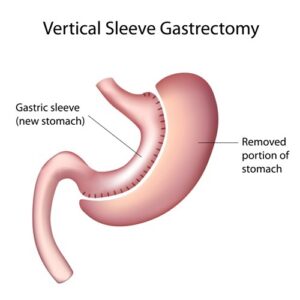Gastric sleeve surgery or sleeve gastrectomy is a bariatric procedure that involves reducing the size of your stomach to limit the amount of food you can eat, which will help you lose your excess weight.
This restrictive procedure works by permanently removing a large portion of your stomach so it can only hold a small amount of food. Sleeve gastrectomy also removes the part of the stomach that produces the hunger-stimulating hormone ghrelin to decrease your appetite. After the surgery, you will feel full after eating much less and be less hungry between meals.
Some advantages of gastric sleeve surgery are that it involves a relatively short hospital stay, requires no rerouting of the food stream, and causes favorable changes in gut hormones that suppress hunger, reduce appetite, and improve satiety. Our specialists offer gastric sleeve surgery in Dubai and will be able to advise whether this is a good option for you.
Am I a suitable candidate for gastric sleeve sur
First and above all, the patient needs to show that they are committed to addressing their obesity and medical condition through a medically supervised program. This includes not only weight loss surgery, but also lifestyle and behavioral changes. You may be eligible for gastric sleeve surgery if:
- You have a BMI measuring 35 or more.
- Your BMI is over 30, and you have other medical conditions such as type 2 diabetes or high blood pressure, which can be improved with weight loss.
- You are fit enough for general anesthesia and surgery.
- You are committed to losing weight and maintaining weight loss through lifestyle and diet changes.
- You have tried to lose weight by eating healthy and exercising for at least six months, but this has not worked.
What are the potential risks and complications?
As with all surgery, risks and complications are inherent. However, our medical practitioners are trained to reduce these risks, and patients are monitored during and after surgery. You may experience some side effects of gastric sleeves, such as pain, bruising, swelling around the cuts, vomiting, or feeling sick after eating more than your small new stomach can handle. You should try to chew your food well, eat smaller portions, and stick to the gastric sleeve diet plan.
Your weight loss surgeon will discuss potential complications and side effects with you in detail before you decide to have gastric sleeve surgery.
What happens during gastric sleeve surgery?
The procedure is performed laparoscopically, using keyhole surgery, under general anesthesia, and usually takes between an hour and an hour and a half.
During the procedure, our bariatric surgeon will make several small incisions in your stomach to insert the laparoscope and other surgical tools to divide your stomach.
The right part of the stomach containing Ghrelin hormones is removed with surgical instruments, while the left side of the stomach is sectioned off with staples to provide a smaller tube-shaped stomach.
The sphincter muscles in the upper and lower stomach are retained, and the new stomach, reduced between 45 to 75 percent, is tubular shaped.
Once the procedure is complete, the surgeon will use dissolving sutures and sterile tape to seal the incision site, to allow for healing.

Aftercare and recovery
- After gastric sleeve surgery, you will stay in the hospital for two to three days.
- You will likely need pain medications. You can take over-the-counter painkillers such as paracetamol or ibuprofen.
- You will only be able to drink clear liquids for the first day after surgery. You will then remain on a liquid diet for several weeks, progressing to soft and moist foods, and after four to six weeks, you will add solid foods.
- Our weight loss surgeon or dietitian will discuss your strict gastric sleeve diet. You will have to eat small portions because your stomach will fill up quickly.
- You should rest after surgery and avoid any strenuous activities. We recommend that you ask a friend or family member to help you with daily activities in the early days.
- Most people can return to their normal activities within two to four weeks after gastric sleeve surgery. Your surgeon will tell you when you can return to work and begin exercising.
What does the Novomed aftercare package include?
- Our premium 2-year aftercare service free of charge.
- Unlimited access to your own specialist weight-loss support team which includes your bariatric surgeon, dietitians, and psychotherapist.
- Unlimited Pre- and Post-operative Care
- Post-surgery diet advice
- Regular weight checks to keep you on track
- 2/5 years advice and support to help with weight loss and to also help maintain weight loss achieved Emergency 24/7 telephone helpline
- Personal virtual trainer to help you back to fitness
What is the cost of gastric sleeve surgery?
The cost of the gastric sleeve procedure in Dubai starts from AED 35,000 but can vary depending on the technique used, complexity of the surgery, and other factors. During your consultation with our expert bariatric surgeon, you can get a personalized estimate based on your specific needs and learn about the financing options available.
If you are interested in this procedure, book your consultation with our bariatric surgeon by calling toll-free 800 (NOVO) 6686 or fill the booking form on our website.

























